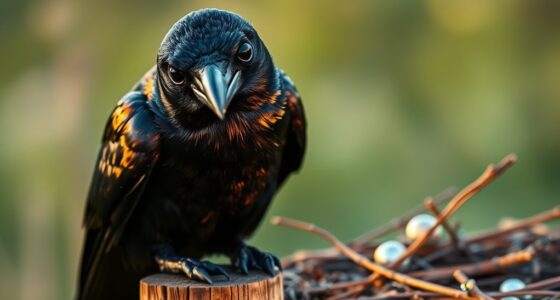Gerbils are more likely than hamsters to learn to “high-five” first because they’re social, active during the day, and respond well to positive reinforcement. Their inquisitiveness and daytime activity make training easier and more consistent. Hamsters tend to be more independent and nocturnal, which can slow progress. If you keep engaging and catering to their natural behaviors, you might be surprised how quickly they pick up new tricks. Keep exploring to discover even more tips to boost your pet’s training success.
Key Takeaways
- Gerbils’ daytime activity and social nature make them more receptive to training, including learning tricks like high-fives.
- Gerbils tend to respond faster to positive reinforcement due to their curiosity and active behavior.
- Hamsters, being more independent and nocturnal, often take longer to learn tricks like high-fives.
- Consistent, short training sessions during their active periods enhance a pet’s chance to learn a high-five.
- Overall, gerbils generally learn to high-five before hamsters because of their social, inquisitive, and daytime activity traits.

When choosing a small pet, many people find themselves debating between gerbils and hamsters, as both are popular and easy to care for. If you’re curious about which one might be more trainable—especially when it comes to tricks like giving high-fives—you’ll want to consider their temperament, training techniques, and dietary needs. Both animals can learn simple commands, but their personalities and habits influence how quickly they pick up new behaviors.
Gerbils tend to be more social and curious, making them slightly easier to train for certain tricks. Their natural inquisitiveness encourages interaction, so with patience and consistent training techniques, you might find that your gerbil responds faster to commands like high-fives. Training a gerbil often involves positive reinforcement—using treats, gentle praise, or petting—to motivate them. Because they’re active during the day and enjoy exploring, you can incorporate short, frequent sessions that keep their attention. Their dietary needs are straightforward; they thrive on a diet of high-quality gerbil pellets, supplemented with fresh vegetables and occasional treats, which can also serve as rewards during training.
Gerbils are social, curious, and respond well to positive reinforcement and short training sessions.
Hamsters, on the other hand, are generally more independent and can be more challenging when it comes to training. They’re often nocturnal, so their active periods tend to be at night, which can make training sessions a bit tricky to schedule. When working with a hamster, you need to be patient and adapt your training techniques to their natural rhythms. Using small, tasty treats and gentle, consistent cues will help. Hamsters’ dietary needs focus on a balanced mix of hamster pellets, fresh fruits, vegetables, and occasional protein treats. Ensuring they’re well-fed and healthy supports their ability to learn and respond to commands.
Both animals can learn to high-five, but your success depends on your approach and their personality. Gerbils’ more social nature and daytime activity make them slightly more receptive to training, especially with the right techniques. Hamsters require more patience, but with gentle persistence and positive reinforcement, they can also learn this simple trick. Ultimately, the key lies in understanding each pet’s unique needs, maintaining consistent training sessions, and providing a proper diet that supports their energy levels and well-being. Additionally, understanding their natural behavior patterns can help tailor your training approach for better results. Whether you’re working with a gerbil or a hamster, your dedication to training techniques and understanding dietary needs will greatly influence how quickly your tiny companion learns to high-five.
Frequently Asked Questions
Which Pet Is Easier to Train for Tricks?
When considering which pet is easier to train for tricks, you’ll find that hamsters often present fewer training challenges due to their more receptive nature. They tend to grasp simple tricks quicker, but trick complexity can vary. Gerbils, while intelligent, may require more patience and consistent effort. Overall, if you want a smoother training experience, hamsters are typically the better choice for beginner trainers.
Do Gerbils or Hamsters Have Better Lifespan?
Think of your pet as a delicate flower in a garden. Gerbils often bloom longer, with a lifespan of 2-4 years, while hamsters typically live 1.5-2 years. Their lifespan depends on factors like a healthy gerbil diet and clean hamster bedding. You can help them thrive by providing proper care, ensuring your tiny companions enjoy more time with you to blossom and bring joy.
Which Pet Requires Less Daily Care?
You’ll find that hamsters generally require less daily care compared to gerbils. Their feeding routines are simpler, often needing just a small amount of food once a day, and they don’t need frequent cage cleaning—usually once a week. Gerbils, on the other hand, need more attention with more frequent feeding and cage cleaning because they tend to be messier. So, if you want less daily effort, hamsters are the better choice.
Are Gerbils or Hamsters More Social?
Did you know that gerbils are generally more social than hamsters? Gerbils thrive on social interactions and often live in groups, exhibiting friendly cage habits. Hamsters tend to be more solitary, preferring limited contact. If you’re looking for a pet that enjoys social behavior and interactive cage habits, gerbils are your best choice. They’ll keep you engaged with their lively, social personalities.
Which Pet Makes Less Noise at Night?
You’ll notice that hamsters tend to make less noise at night due to their nocturnal behavior. They’re generally quieter because they’re active during the night and sleep during the day. Gerbils, on the other hand, are more social and active, which can lead to higher sound levels at night. If quietness is your priority, a hamster might be a better choice since they usually produce less noise during their active hours.
Conclusion
Ultimately, whether you’re cheering for gerbils or hamsters, remember that patience is a virtue. Both tiny pets can surprise you with their cleverness and quick learning, but it’s your consistent effort that makes the difference. As the saying goes, “Practice makes perfect.” Keep bonding, stay patient, and you’ll see your pocket pet master the high-five in no time. After all, every small step counts on the road to a big achievement.









